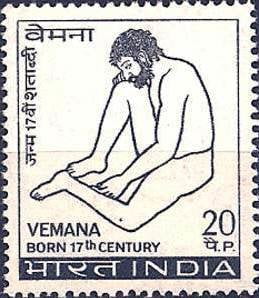Truths of Life by Yogi Vemana
Here are some of his popular verses that capture life’s realities:
- On the elusiveness of truth: “Truth is a leech that sticks to those it bites” (This proverb highlights the difficulty of finding and accepting truth).
- On the power of knowledge: “A head filled with wisdom is better than a house filled with gold” (This emphasizes the value of knowledge over material possessions).
- On impermanence: “This world is like a marketplace; some come, some go” (This verse reminds us of life’s fleeting nature).
- On the importance of good company: “Walk with the wise, you become wise. Walk with the foolish, you become foolish” (This proverb highlights the influence of our companions).
- On the nature of desire: “Desires are like leeches; the more you satisfy them, the more they grow” (This verse warns against the insatiable nature of desires).
These are just a few examples. Yogi Vemana’s poems often deal with social issues, human behavior, and the complexities and Truths of Life. You can find more of his verses translated into English by searching online or at your local library.
The details surrounding Yogi Vemana’s life story are a bit hazy. Scholars haven’t reached a consensus on the exact time period he lived in, with estimates ranging from the 15th to the 18th centuries.
Early Life and Background:
- There’s some debate about his birthplace, but many sources point to Gandikota, Andhra Pradesh, India.
- There’s also uncertainty around his real name, with “Vemana” being the name he’s popularly known by.
- Some accounts portray him as a Vedic scholar, well-versed in ancient Hindu scriptures.
The Story of Persistence:
- A popular story depicts Vemana as a young boy perceived to be slow in learning.
- Despite struggles with traditional schooling, he possessed unwavering focus and determination.
- This story emphasizes the importance of unwavering purpose, not necessarily intellectual brilliance, on the path to enlightenment.
Life as a Yogi:
- Details about his yogic practices are scarce, but he’s referred to as a yogi and associated with the Achala Siddhanta school of thought.
- He likely traveled extensively throughout South India, encountering diverse people and experiences and learned Truths of Life.
Legacy:
- Vemana is revered for his insightful poems (called Vachanas) written in Telugu.
- These poems tackle social issues, human behavior, and profound truths of life in a simple yet impactful way.
- His verses are widely quoted and appreciated even today, making him a significant figure in Telugu literature and philosophy.
Further Exploration:
- If you’d like to delve deeper, you can search for “Vemana” and “Achala Siddhanta” online to find more information.
- Look for translated collections of Vemana’s Vachanas to gain a firsthand perspective on his wisdom and Truths of Life.
His poems are celebrated for their simplicity, native idioms, and profound themes. Let’s explore some of his Truths of Life:
- Transient Nature of Life: Vemana reflects on the reality of life, where people are born on Earth, live, play with mud, depart from it, and are reborn. He emphasizes the impermanence of life on Earth, considering it a temporary abode rather than the ultimate destination.
- Even Deities Have a Lifespan: Vemana suggests that even Brahma, Vishnu, and Shiva have finite lifespans. He asserts that eternal life in the physical body is unattainable, as even Brahma faces death eventually. Time passes inexorably, and no one—deity or mortal—can reverse it.
- Empathy for Animals: In one of his poems, Vemana pleads for empathy toward animals. He advocates against killing animals, emphasizing their shared existence with humans. Animals, too, experience life, birth, and death, much like humans do.
Image credit
Post of India, GODL-India, via Wikimedia Commons

